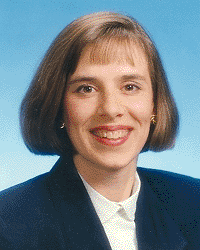 1993 Outstanding Scientific Achievements by a Young Investigator
1993 Outstanding Scientific Achievements by a Young Investigator
Marcie J. Hursting will receive the 18th annual award, sponsored by Boehringer Mannheim Corporation. Hursting received her B.S. in chemistry from North Carolina State University, Raleigh, NC (1979), and Ph.D. in biochemistry from the University of North Carolina, Chapel Hill, NC (1985). She also completed a postdoctoral fellowship in clinical chemistry with toxicology specialization at the University of Washington, Seattle, WA (1987).
She then joined Organon Teknika Corporation, a medical diagnostics company headquartered in Durham, NC, first as a Senior Scientist and then becoming Group Leader of Immunochemistry/Enzymology Research. In 1992, she moved to Frederick, MD, where she currently serves as a consultant for Organon Teknika. In addition to conducting research, Hursting actively promotes public awareness of the clinical chemistry profession. She joined the the Association for Diagnostics & Laboratory Medicine (formerly AACC) in 1985, and, besides serving in local section offices, has been involved at the national level, serving on the Career Education (1986–90) and Public Issues (1991–present) Committees. In 1990, Hursting was certified as a Diplomate of the American Board of Clinical Chemistry.
Hursting’s research interests include the clinical application of immunochemical technologies and the clinical biochemistry of coagulation. She has published more than 40 journal articles, patents, and abstracts in these areas. Her doctoral work, which focused on the interactions of coagulation proteins and phospholipid surfaces, was recognized by grant awards from the American Chemical Society and American Heart Association. During her postdoctoral training, she studied the use of Fab antibody fragments as immunotherapeutic agents for drug overdoses and established methods for monitoring the efficacy of such immunotherapy. For her studies on Fab immunotherapy of tricyclic antidepressant overdose in a rabbit model, she was awarded the Young Investigator Award with Distinction by the Academy of Clinical Laboratory Physicians and Scientists in 1986.
She continued her research on application of immunochemical technologies at Organon Teknika, where she developed the first monoclonal antibody-based immunoassay for the prothrombin activation fragment 1.2 and evaluated its clinical utility for assessing thrombotic risk and monitoring anticoagulant therapy. For those studies, she earned the Organon Teknika Research Excellence Award in 1990. At Organon Teknika, she also managed a research group that developed immunochemical, chromogenic, and clot-based assays for assessing thrombotic and hemorrhagic disorders for use on an automated clinical analyzer in concurrent design.